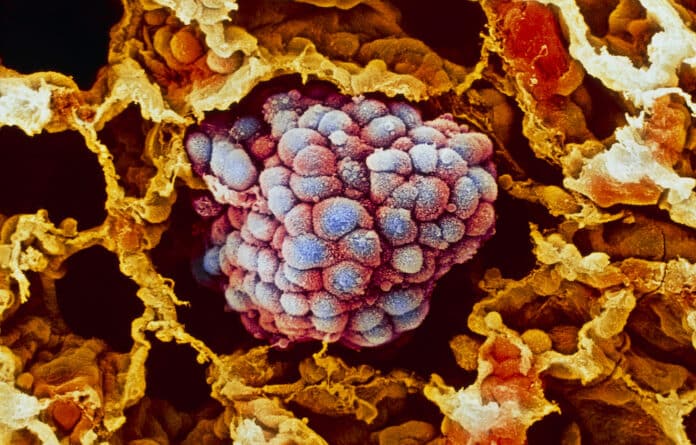
Researchers at the Francis Crick Institute, in collaboration with Revolution Medicines, have shown that a combination of treatments can improve the effectiveness of immunotherapy in lung cancer. The study, published today in Nature Communications, indicates that simultaneous targeting of tumors using multiple treatment modalities could improve treatment response, particularly in tumors that become resistant to standard therapies.
The researchers used a combination of tool compounds in mice with lung cancer, specifically targeting KRAS G12C—a known driver of lung cancer in humans. The compounds used in the research represented targeted drugs designed to block KRAS G12C which have been approved for use, but often lead to treatment resistance; immunotherapies (only shown to benefit about 20 percent of patients); and a newly developed KRAS G12C inhibitor with a compound that blocks the SHP2 protein, which inhibits cancer cells but has also been shown to activate tumor immunity.
“Blocking genes like KRAS in lung cancer has led to some exciting new developments, but we still see problems with resistance,” said Julian Downward, principal group leader at the Crick. “We’ve now been able to report partial or complete eradication of tumors in mice by combining KRAS and SHP2 inhibitors with immunotherapy. We also showed that this combination therapy allows ‘immune cold’ tumors to respond to the body’s own defenses.”
The treatment regimen included an immune checkpoint inhibitor combined with the other two treatments. In mice with functional immune systems, the triple combination significantly reduced tumor size and, in some cases, completely eradicated the tumors. Importantly, the mouse models also were more resistant to cancer recurrence after receiving these treatments.
The investigators also found that this combination therapy could effectively sensitize “immune cold” tumors—those typically unresponsive to immunotherapy—allowing them to respond to immune checkpoint inhibitors. “Our work stresses the importance of targeting tumors from all angles, especially ones that don’t respond easily to treatment,” noted first author Panos Anastasiou, a PhD student in the Oncogene Biology Laboratory at the Crick.
In addition to the initial findings, the study explored the potential to improve treatment response by combining the KRAS G12C and SHP2 inhibitors with other immunotherapies, particularly anti-CTLA-4 blocking antibodies. The researchers observed that this combination not only sensitized immune-tumors to anti-CTLA-4 treatment but also led to a durable response, suggesting that such approaches may provide additional clinical benefits. “Given the numerous changes in immune cell populations induced by the combined inhibition of KRAS and SHP2, this provides rationale for combination with other immunotherapies,” the researchers noted.
This research aligns with previous studies indicating that anti-PD-(L)1 blocking antibodies are commonly used as a first-line treatment for patients with KRAS-mutant non-small cell lung cancer (NSCLC). However, the investigators emphasized that while initial clinical activity data have been reported for RMC-6291—a new RAS(ON) G12C-selective inhibitor—further evaluation is essential. The preliminary findings are promising but highlight the ongoing challenge of treatment resistance.
The study did raise concerns regarding the potential for increased toxicity associated with combination therapies. Initial reports from clinical trials combining sotorasib (another KRAS inhibitor) with anti-PD-1 checkpoint blockade indicated a high incidence of immune-related hepatotoxicity. “It is important to consider the potential toxicities of these combinations,” the researchers cautioned adding that future studies will need to explore the mechanisms behind these toxicities, as well as strategies to minimize them.
Still, the combination of KRAS and SHP2 inhibitors alongside immunotherapy represents an important step to address the challenges of treating lung cancer. The researchers are optimistic about moving this new combination therapy approach into clinical studies to assess their safety and efficacy in humans.










![Best Weight Loss Supplements [2022-23] New Reports!](https://technologytangle.com/wp-content/uploads/2022/12/p1-1170962-1670840878.png)




